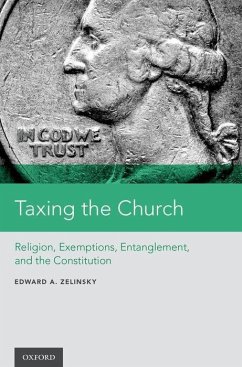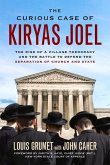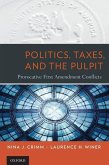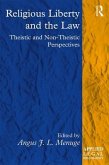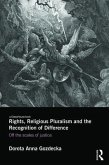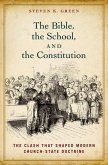- Gebundenes Buch
- Merkliste
- Auf die Merkliste
- Bewerten Bewerten
- Teilen
- Produkt teilen
- Produkterinnerung
- Produkterinnerung
This book explores the taxation and exemption of churches and other religious institutions revealing that they are treated diversely by the federal and state tax systems. Either taxing or exempting churches and other sectarian entities entangles church and state. The taxes to which churches are more frequently subject - federal Social Security and Medicare taxes, sales taxes, real estate conveyance taxes - fall on the less entangling end of the spectrum. The taxesfrom which religious institutions are exempt - general income taxes, value-based property taxes, unemployment taxes - are typically…mehr
Andere Kunden interessierten sich auch für
![The Curious Case of Kiryas Joel: The Rise of a Village Theocracy and the Battle to Defend the Separation of Church and State The Curious Case of Kiryas Joel: The Rise of a Village Theocracy and the Battle to Defend the Separation of Church and State]() Louis GrumetThe Curious Case of Kiryas Joel: The Rise of a Village Theocracy and the Battle to Defend the Separation of Church and State23,99 €
Louis GrumetThe Curious Case of Kiryas Joel: The Rise of a Village Theocracy and the Battle to Defend the Separation of Church and State23,99 €![Politics, Taxes, and the Pulpit Politics, Taxes, and the Pulpit]() Nina J CrimmPolitics, Taxes, and the Pulpit117,99 €
Nina J CrimmPolitics, Taxes, and the Pulpit117,99 €![Illegal Immigration and the Destruction of America Illegal Immigration and the Destruction of America]() James F. LinzeyIllegal Immigration and the Destruction of America23,99 €
James F. LinzeyIllegal Immigration and the Destruction of America23,99 €![The New World Order and the Destruction of America The New World Order and the Destruction of America]() James F. LinzeyThe New World Order and the Destruction of America23,99 €
James F. LinzeyThe New World Order and the Destruction of America23,99 €![Religious Liberty and the Law Religious Liberty and the Law]() Religious Liberty and the Law179,99 €
Religious Liberty and the Law179,99 €![Rights, Religious Pluralism and the Recognition of Difference Rights, Religious Pluralism and the Recognition of Difference]() Dorota Anna GozdeckaRights, Religious Pluralism and the Recognition of Difference179,99 €
Dorota Anna GozdeckaRights, Religious Pluralism and the Recognition of Difference179,99 €![Bible, the School, and the Constitution Bible, the School, and the Constitution]() Steven K GreenBible, the School, and the Constitution67,99 €
Steven K GreenBible, the School, and the Constitution67,99 €-
-
-
This book explores the taxation and exemption of churches and other religious institutions revealing that they are treated diversely by the federal and state tax systems. Either taxing or exempting churches and other sectarian entities entangles church and state. The taxes to which churches are more frequently subject - federal Social Security and Medicare taxes, sales taxes, real estate conveyance taxes - fall on the less entangling end of the spectrum. The taxesfrom which religious institutions are exempt - general income taxes, value-based property taxes, unemployment taxes - are typically taxes with the greatest enforcement potential for church-state entanglement.
Produktdetails
- Produktdetails
- Verlag: Oxford University Press, USA
- Seitenzahl: 278
- Erscheinungstermin: 25. Oktober 2017
- Englisch
- Abmessung: 239mm x 155mm x 23mm
- Gewicht: 522g
- ISBN-13: 9780190853952
- ISBN-10: 0190853956
- Artikelnr.: 48454622
- Verlag: Oxford University Press, USA
- Seitenzahl: 278
- Erscheinungstermin: 25. Oktober 2017
- Englisch
- Abmessung: 239mm x 155mm x 23mm
- Gewicht: 522g
- ISBN-13: 9780190853952
- ISBN-10: 0190853956
- Artikelnr.: 48454622
Edward A. Zelinsky is the Morris and Annie Trachman Professor of Law at the Benjamin N. Cardozo School of Law of Yeshiva University where he lectures on tax law. He is a graduate of Yale College, Yale Law School, and the Yale Graduate School. Professor Zelinsky's articles have appeared in the nation's most well-known legal journals including the Harvard Law Review, the Yale Law Journal, and the Columbia Law Review. He is the author of The Origins of the Ownership Society: How the Defined Contribution Paradigm Changed America (Oxford University Press, 2007), and he is a regular contributor to the OUP blog.
Acknowledgments
Introduction
Chapter One: The Federal Constitutional Law on Taxation and Religion
A) Murdock and Follett
B) Walz
C) Texas Monthly
D) Jimmy Swaggart Ministries
E) Nyquist and Mueller
F) Lee
G) Conclusion
Chapter Two: State Constitutions on Religion and
Taxation
A) State constitutional exemptions from
property taxation
B) Interpreting "church" for property tax
exemption purposes
C) The property tax status of parsonages
D) Other state constitutional provisions
E) Conclusion
Chapter Three: The Internal Revenue Code and Religious Institutions
A) The Federal Income Tax
B) The Federal Estate and Gift Taxes
C) The FICA and Self-employment Taxes
D) The Federal Unemployment Tax
E) The Federal Health Mandates for
Individuals and Employers
F) The Code's procedural provisions
relative to churches
G) Church retirement plans
H) Conclusion
Chapter Four: State Tax Statutes and Religious
Exemptions
A) Property Tax Exemption Statutes
B) Sales Taxes: Overview
C) States subjecting churches to sales taxes
as both buyers and sellers
D) States exempting churches on sales taxes
as both buyers and sellers
E) States exempting churches as buyers but
not as sellers
F) States exempting churches as sellers but
not as buyers
G) Church sales tax exemption tied to IRS
confirmation of income tax exemption
H) Sales tax: Summary
I) State Income Taxes
J) Real Estate Transfer Taxes
K) State Unemployment Taxes
L) Conclusion
Chapter Five: Untangling Entanglement
A) The Inevitability of Tax-Related
Entanglement: Borderline Entanglement and
Enforcement Entanglement in The Courts
B) Reducing Borderline Entanglement Through
Broader Exemptions or No Exemptions
C) Enforcement Entanglement, Property Taxes
and General Income Taxes
D) Sales, Payroll and Real Estate Conveyance
Taxes: Less Prone to Enforcement
Entanglement
E) The Entangling Taxation of Unrelated
Business Incomes
F) The Entangling Trade-offs of Unemployment
Compensation
G) Entanglement, Subsidization, Tax Policy
Criteria and the Normative Tax Base
H) Why Entanglement Matters
I) Conclusion
Chapter Six: Parsonages, Parsonage Allowances and
the Religious Exemptions From Social
Security Taxes and the Health Care
Mandate
A) The Property Tax Status of Parsonages
B) The Income Tax Treatment of Parsonages
and Parsonage Allowances: Code Sections
107 and 119
C) Repealing Section 107: Swapping
Borderline Entanglement for Enforcement
Entanglement
D) Swapping One Borderline Entanglement
for Another: Section 107 v. Section 119
E) A Broader Possibility: Neither Section
107 nor Section 119 Applies to Religious Employers
F) Section 107(2) as a Matter of Tax Policy
G) The Constitutionality of the Religious
Exemptions From The Social Security Taxes
and the Individual Health Care Mandate
H) A Final Word on Lemon
I) Conclusion
Chapter Seven: Other Issues For the Future: Churches'
Lobbying, Campaigning, and Sales
Taxation
A) Section 501(c)(3)'s Bans on Substantial
Lobbying and Political Campaigning
B) The Controversy
C) A Proposal to Protect Internal Church
Communications
D) Expanding the Sales Tax Obligations of
Churches
E) Conclusion
Chapter Eight: Constitutional and Tax Policy Issues
A) The Original Understanding of the Religion
Clauses of the First Amendment:
Prohibiting a National Church v. Nonpreferentialism v. Separationism
B) Exempting Churches From Laws of General Applicability: The Relative Merits of
Judicial and Legislative Decisionmaking
C) The Criteria Governing Legislative
Exemptions from Laws of General
Applicability
D) The Rhetoric of Separationism
E) To Tax or Exempt the Profits of
Nonprofits
F) Revisiting the Unrelated Business
Income Tax (UBIT)
G) Conclusion
Conclusion
Index
Introduction
Chapter One: The Federal Constitutional Law on Taxation and Religion
A) Murdock and Follett
B) Walz
C) Texas Monthly
D) Jimmy Swaggart Ministries
E) Nyquist and Mueller
F) Lee
G) Conclusion
Chapter Two: State Constitutions on Religion and
Taxation
A) State constitutional exemptions from
property taxation
B) Interpreting "church" for property tax
exemption purposes
C) The property tax status of parsonages
D) Other state constitutional provisions
E) Conclusion
Chapter Three: The Internal Revenue Code and Religious Institutions
A) The Federal Income Tax
B) The Federal Estate and Gift Taxes
C) The FICA and Self-employment Taxes
D) The Federal Unemployment Tax
E) The Federal Health Mandates for
Individuals and Employers
F) The Code's procedural provisions
relative to churches
G) Church retirement plans
H) Conclusion
Chapter Four: State Tax Statutes and Religious
Exemptions
A) Property Tax Exemption Statutes
B) Sales Taxes: Overview
C) States subjecting churches to sales taxes
as both buyers and sellers
D) States exempting churches on sales taxes
as both buyers and sellers
E) States exempting churches as buyers but
not as sellers
F) States exempting churches as sellers but
not as buyers
G) Church sales tax exemption tied to IRS
confirmation of income tax exemption
H) Sales tax: Summary
I) State Income Taxes
J) Real Estate Transfer Taxes
K) State Unemployment Taxes
L) Conclusion
Chapter Five: Untangling Entanglement
A) The Inevitability of Tax-Related
Entanglement: Borderline Entanglement and
Enforcement Entanglement in The Courts
B) Reducing Borderline Entanglement Through
Broader Exemptions or No Exemptions
C) Enforcement Entanglement, Property Taxes
and General Income Taxes
D) Sales, Payroll and Real Estate Conveyance
Taxes: Less Prone to Enforcement
Entanglement
E) The Entangling Taxation of Unrelated
Business Incomes
F) The Entangling Trade-offs of Unemployment
Compensation
G) Entanglement, Subsidization, Tax Policy
Criteria and the Normative Tax Base
H) Why Entanglement Matters
I) Conclusion
Chapter Six: Parsonages, Parsonage Allowances and
the Religious Exemptions From Social
Security Taxes and the Health Care
Mandate
A) The Property Tax Status of Parsonages
B) The Income Tax Treatment of Parsonages
and Parsonage Allowances: Code Sections
107 and 119
C) Repealing Section 107: Swapping
Borderline Entanglement for Enforcement
Entanglement
D) Swapping One Borderline Entanglement
for Another: Section 107 v. Section 119
E) A Broader Possibility: Neither Section
107 nor Section 119 Applies to Religious Employers
F) Section 107(2) as a Matter of Tax Policy
G) The Constitutionality of the Religious
Exemptions From The Social Security Taxes
and the Individual Health Care Mandate
H) A Final Word on Lemon
I) Conclusion
Chapter Seven: Other Issues For the Future: Churches'
Lobbying, Campaigning, and Sales
Taxation
A) Section 501(c)(3)'s Bans on Substantial
Lobbying and Political Campaigning
B) The Controversy
C) A Proposal to Protect Internal Church
Communications
D) Expanding the Sales Tax Obligations of
Churches
E) Conclusion
Chapter Eight: Constitutional and Tax Policy Issues
A) The Original Understanding of the Religion
Clauses of the First Amendment:
Prohibiting a National Church v. Nonpreferentialism v. Separationism
B) Exempting Churches From Laws of General Applicability: The Relative Merits of
Judicial and Legislative Decisionmaking
C) The Criteria Governing Legislative
Exemptions from Laws of General
Applicability
D) The Rhetoric of Separationism
E) To Tax or Exempt the Profits of
Nonprofits
F) Revisiting the Unrelated Business
Income Tax (UBIT)
G) Conclusion
Conclusion
Index
Acknowledgments
Introduction
Chapter One: The Federal Constitutional Law on Taxation and Religion
A) Murdock and Follett
B) Walz
C) Texas Monthly
D) Jimmy Swaggart Ministries
E) Nyquist and Mueller
F) Lee
G) Conclusion
Chapter Two: State Constitutions on Religion and
Taxation
A) State constitutional exemptions from
property taxation
B) Interpreting "church" for property tax
exemption purposes
C) The property tax status of parsonages
D) Other state constitutional provisions
E) Conclusion
Chapter Three: The Internal Revenue Code and Religious Institutions
A) The Federal Income Tax
B) The Federal Estate and Gift Taxes
C) The FICA and Self-employment Taxes
D) The Federal Unemployment Tax
E) The Federal Health Mandates for
Individuals and Employers
F) The Code's procedural provisions
relative to churches
G) Church retirement plans
H) Conclusion
Chapter Four: State Tax Statutes and Religious
Exemptions
A) Property Tax Exemption Statutes
B) Sales Taxes: Overview
C) States subjecting churches to sales taxes
as both buyers and sellers
D) States exempting churches on sales taxes
as both buyers and sellers
E) States exempting churches as buyers but
not as sellers
F) States exempting churches as sellers but
not as buyers
G) Church sales tax exemption tied to IRS
confirmation of income tax exemption
H) Sales tax: Summary
I) State Income Taxes
J) Real Estate Transfer Taxes
K) State Unemployment Taxes
L) Conclusion
Chapter Five: Untangling Entanglement
A) The Inevitability of Tax-Related
Entanglement: Borderline Entanglement and
Enforcement Entanglement in The Courts
B) Reducing Borderline Entanglement Through
Broader Exemptions or No Exemptions
C) Enforcement Entanglement, Property Taxes
and General Income Taxes
D) Sales, Payroll and Real Estate Conveyance
Taxes: Less Prone to Enforcement
Entanglement
E) The Entangling Taxation of Unrelated
Business Incomes
F) The Entangling Trade-offs of Unemployment
Compensation
G) Entanglement, Subsidization, Tax Policy
Criteria and the Normative Tax Base
H) Why Entanglement Matters
I) Conclusion
Chapter Six: Parsonages, Parsonage Allowances and
the Religious Exemptions From Social
Security Taxes and the Health Care
Mandate
A) The Property Tax Status of Parsonages
B) The Income Tax Treatment of Parsonages
and Parsonage Allowances: Code Sections
107 and 119
C) Repealing Section 107: Swapping
Borderline Entanglement for Enforcement
Entanglement
D) Swapping One Borderline Entanglement
for Another: Section 107 v. Section 119
E) A Broader Possibility: Neither Section
107 nor Section 119 Applies to Religious Employers
F) Section 107(2) as a Matter of Tax Policy
G) The Constitutionality of the Religious
Exemptions From The Social Security Taxes
and the Individual Health Care Mandate
H) A Final Word on Lemon
I) Conclusion
Chapter Seven: Other Issues For the Future: Churches'
Lobbying, Campaigning, and Sales
Taxation
A) Section 501(c)(3)'s Bans on Substantial
Lobbying and Political Campaigning
B) The Controversy
C) A Proposal to Protect Internal Church
Communications
D) Expanding the Sales Tax Obligations of
Churches
E) Conclusion
Chapter Eight: Constitutional and Tax Policy Issues
A) The Original Understanding of the Religion
Clauses of the First Amendment:
Prohibiting a National Church v. Nonpreferentialism v. Separationism
B) Exempting Churches From Laws of General Applicability: The Relative Merits of
Judicial and Legislative Decisionmaking
C) The Criteria Governing Legislative
Exemptions from Laws of General
Applicability
D) The Rhetoric of Separationism
E) To Tax or Exempt the Profits of
Nonprofits
F) Revisiting the Unrelated Business
Income Tax (UBIT)
G) Conclusion
Conclusion
Index
Introduction
Chapter One: The Federal Constitutional Law on Taxation and Religion
A) Murdock and Follett
B) Walz
C) Texas Monthly
D) Jimmy Swaggart Ministries
E) Nyquist and Mueller
F) Lee
G) Conclusion
Chapter Two: State Constitutions on Religion and
Taxation
A) State constitutional exemptions from
property taxation
B) Interpreting "church" for property tax
exemption purposes
C) The property tax status of parsonages
D) Other state constitutional provisions
E) Conclusion
Chapter Three: The Internal Revenue Code and Religious Institutions
A) The Federal Income Tax
B) The Federal Estate and Gift Taxes
C) The FICA and Self-employment Taxes
D) The Federal Unemployment Tax
E) The Federal Health Mandates for
Individuals and Employers
F) The Code's procedural provisions
relative to churches
G) Church retirement plans
H) Conclusion
Chapter Four: State Tax Statutes and Religious
Exemptions
A) Property Tax Exemption Statutes
B) Sales Taxes: Overview
C) States subjecting churches to sales taxes
as both buyers and sellers
D) States exempting churches on sales taxes
as both buyers and sellers
E) States exempting churches as buyers but
not as sellers
F) States exempting churches as sellers but
not as buyers
G) Church sales tax exemption tied to IRS
confirmation of income tax exemption
H) Sales tax: Summary
I) State Income Taxes
J) Real Estate Transfer Taxes
K) State Unemployment Taxes
L) Conclusion
Chapter Five: Untangling Entanglement
A) The Inevitability of Tax-Related
Entanglement: Borderline Entanglement and
Enforcement Entanglement in The Courts
B) Reducing Borderline Entanglement Through
Broader Exemptions or No Exemptions
C) Enforcement Entanglement, Property Taxes
and General Income Taxes
D) Sales, Payroll and Real Estate Conveyance
Taxes: Less Prone to Enforcement
Entanglement
E) The Entangling Taxation of Unrelated
Business Incomes
F) The Entangling Trade-offs of Unemployment
Compensation
G) Entanglement, Subsidization, Tax Policy
Criteria and the Normative Tax Base
H) Why Entanglement Matters
I) Conclusion
Chapter Six: Parsonages, Parsonage Allowances and
the Religious Exemptions From Social
Security Taxes and the Health Care
Mandate
A) The Property Tax Status of Parsonages
B) The Income Tax Treatment of Parsonages
and Parsonage Allowances: Code Sections
107 and 119
C) Repealing Section 107: Swapping
Borderline Entanglement for Enforcement
Entanglement
D) Swapping One Borderline Entanglement
for Another: Section 107 v. Section 119
E) A Broader Possibility: Neither Section
107 nor Section 119 Applies to Religious Employers
F) Section 107(2) as a Matter of Tax Policy
G) The Constitutionality of the Religious
Exemptions From The Social Security Taxes
and the Individual Health Care Mandate
H) A Final Word on Lemon
I) Conclusion
Chapter Seven: Other Issues For the Future: Churches'
Lobbying, Campaigning, and Sales
Taxation
A) Section 501(c)(3)'s Bans on Substantial
Lobbying and Political Campaigning
B) The Controversy
C) A Proposal to Protect Internal Church
Communications
D) Expanding the Sales Tax Obligations of
Churches
E) Conclusion
Chapter Eight: Constitutional and Tax Policy Issues
A) The Original Understanding of the Religion
Clauses of the First Amendment:
Prohibiting a National Church v. Nonpreferentialism v. Separationism
B) Exempting Churches From Laws of General Applicability: The Relative Merits of
Judicial and Legislative Decisionmaking
C) The Criteria Governing Legislative
Exemptions from Laws of General
Applicability
D) The Rhetoric of Separationism
E) To Tax or Exempt the Profits of
Nonprofits
F) Revisiting the Unrelated Business
Income Tax (UBIT)
G) Conclusion
Conclusion
Index

